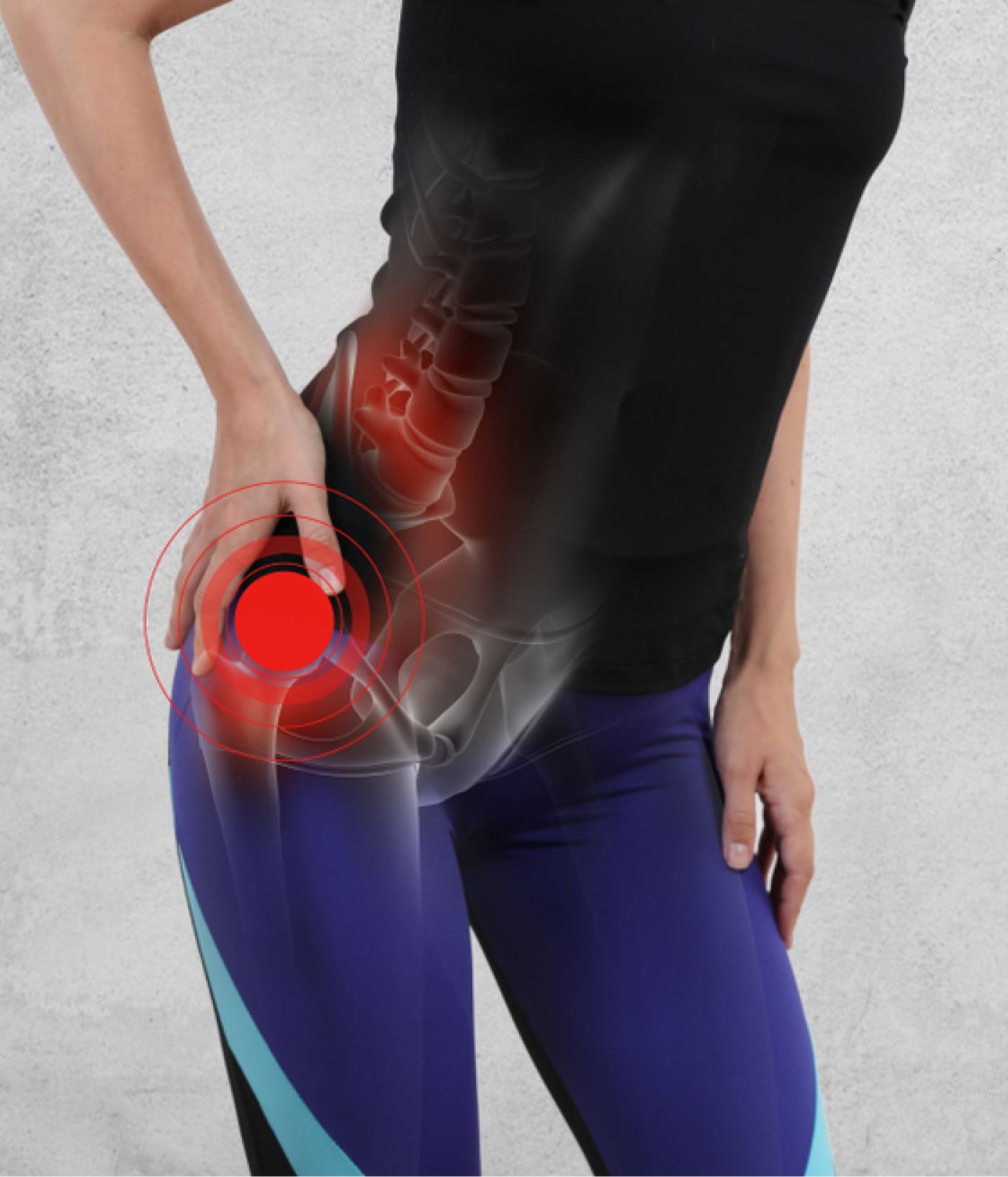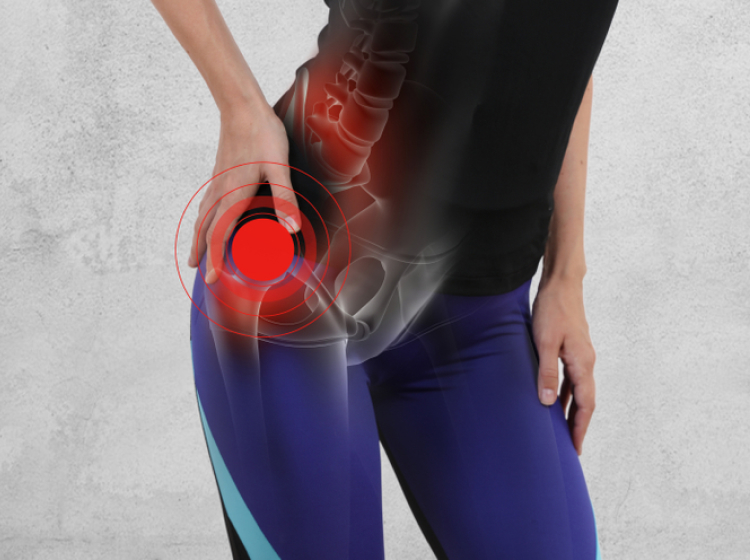Hip Impingement Specialist In Singapore

Dr Wang Lushun
Senior Consultant Orthopaedic Surgeon
MBBS (Singapore)
MRCS (Edin)
MMed (Ortho)
FRCS (Ortho) (Edin)
- Get active again by treating your Hip Impingement
- Fellowship-trained orthopedic surgeon
- Internationally recognised, more than 1500 surgeries performed



What is Hip Impingement?
Hip impingement, a condition affecting the ball-and-socket hip joint, occurs when the femur’s rounded head and the acetabulum in the pelvis don’t fit together optimally, leading to friction and discomfort. This misalignment, involving either abnormal bone growth or soft tissue compression, can manifest as femoroacetabular impingement (FAI) or ischiofemoral impingement, which can both impair quality of life and mobility. Early diagnosis and treatment are vital for preserving joint health and preventing complications such as cartilage damage, labral tears, and osteoarthritis.
Symptoms Of Hip Impingement
Hip impingement can present in various ways, often affecting one's daily activities and overall well-being. Recognizing the symptoms early on is essential for timely diagnosis and treatment, and may help prevent further complications. Common symptoms of hip impingement include:
Pain
Typically felt in the groin area, hip, or front of the thigh, the intensity of pain may vary from mild discomfort to severe, depending on the extent of the impingement. Pain may worsen during or after activities that involve hip movement, such as walking, running, or climbing stairs.
Stiffness
Limited hip mobility due to stiffness can make it difficult to perform daily tasks, such as bending down or putting on shoes. Stiffness may be more prominent after prolonged periods of inactivity, like sitting or lying down.
Reduced range of motion
Difficulty in moving the hip joint through its full range of motion, leading to challenges in performing certain movements, such as squatting or lifting the leg.
Clicking or locking sensation
Some individuals with hip impingement may experience a clicking, snapping, or locking sensation in the hip joint during movement, indicating possible damage to the cartilage or labrum.
Is Your Hip Impingement
Keeping You On The Sidelines?
Keeping You On The Sidelines?
Restore your hip’s function and mobility and prevent further damage or complications.
Does Hip Impingement Go Away By Itself?
Hip impingement does not typically resolve by itself. While mild cases may initially be managed through non-surgical methods such as physical therapy, activity modification, and pain management, these approaches are primarily aimed at reducing symptoms and improving joint function rather than eliminating underlying structural abnormalities causing the impingement. Consequently, persistent or severe cases may require surgical intervention to address the root cause and prevent further joint damage.
Causes of Hip Impingement
Understanding the causes of hip impingement can help implement preventative measures and tailor treatment plans. The primary causes of hip impingement include:
Congenital factors
Some individuals may be born with hip joint irregularities, such as an abnormally shaped femoral head or acetabulum, which predispose them to develop hip impingement over time.
Developmental factors
During childhood and adolescence, growth plate abnormalities or unusual bone development can lead to hip joint misalignment, increasing the risk of impingement later in life.
Acquired factors
Trauma, injury, or overuse of the hip joint can cause changes in the hip's anatomy, potentially leading to impingement. Inflammation and bone spurs may also contribute to the development of hip impingement.
Sports and activities
Certain sports and activities that involve repetitive hip movements, such as ballet, soccer, or running, can increase the risk of developing hip impingement due to the stress placed on the joint.
Diagnosing Hip Impingement
If you are experiencing symptoms of hip impingement, your orthopaedic specialist may perform a physical examination to evaluate your range of motion and perform impingement tests to identify pain location and intensity. Your specialist may also order imaging tests such as X-rays, MRI scans, and CT scans to detect bone abnormalities, assess joint space, and evaluate soft tissue damage. Diagnostic injections may be administered to confirm or rule out hip impingement as the cause of your symptoms. Your response to pain relief after the injection can help determine the appropriate course of treatment.
Non-surgical Treatment Options
Non-surgical treatments for Hip Impingement include:
- Physiotherapies and/or tailored exercise programs to improve flexibility, strength, and joint stability.
- Pain management through oral anti-inflammatory medications or corticosteroid injections.
- Lifestyle changes like adjusting daily routines and avoiding activities that exacerbate symptoms can relieve stress on the hip.
Surgical Treatment Options
Surgical treatments for Hip Impingement include:
- Hip arthroscopy is a minimally invasive procedure to remove bone spurs, repair torn labrum, and reshape the joint.
- Open surgery involves a more extensive approach for complex cases, requiring direct access to the hip joint to correct deformities.
- Hip preservation techniques include procedures such as periacetabular osteotomy (PAO) to reposition the acetabulum and improve joint function.


Dr Wang Lushun
Senior Consultant Orthopaedic Surgeon
MBBS (Singapore)
MRCS (Edin)
MMed (Ortho)
FRCS (Ortho) (Edin)
Internationally Recognised & Double Fellowship-Trained Surgeon With Over 18 Years of Experience
- Bachelor of Medicine & Bachelor of Surgery (MBBS),
National University of Singapore - Member of The Royal College of Surgeons (MRCS),
Edinburgh, United Kingdom - Master of Medicine in Orthopaedic Surgery (MMed),
National University of Singapore - Fellow of The Royal College of Surgeons in Orthopaedics and Traumatology (FRCS), Edinburgh, United Kingdom
As a Senior Consultant Orthopaedic Surgeon and former Head of the Hip and Knee Division in Ng Teng Fong Hospital, he has won awards for superior patient outcomes (value driven), service quality and enhanced recovery programmes. His patients include current and former national athletes and sporting professionals.
Prevention of Hip Impingement
Maintaining hip joint health after recovering from hip impingement requires a focus on prevention and maintenance strategies. Emphasizing flexibility and strength through mobility exercises helps to minimize the risk of future issues. Practising proper body mechanics during daily activities and sports can reduce the likelihood of recurrent hip impingement. Additionally, regular check-ups and monitoring by your specialist can help detect early signs of potential problems.
Recovery after Hip Impingement Treatment
Following surgical treatment for hip impingement, a comprehensive post-surgical care plan is implemented to ensure optimal recovery. This plan includes pain management, wound care, and the gradual reintroduction of weight-bearing activities. Physical therapy plays a crucial role in the rehabilitation process, with targeted exercises designed to restore strength, flexibility, and joint stability. As the patient progresses, they will be guided through a gradual return to daily activities and sports, ensuring a safe and effective transition back to their pre-surgery routine.
Why Choose
Dr Wang Lushun?
Trusted
Leadership on Orthopaedic Advisory Boards
Skilful
Double Fellowships at Centres of Excellence
Experienced
Senior Consultant with Over 18 Years of Experience
Patient-Centred Orthopaedic Care
We are dedicated to your recovery and well-being. Every patient deserves the freedom that comes with active living. Whether you're an athlete sidelined by an injury or a weekend hobbyist desperate to return to your passion, our mission is to help you regain your mobility and independence.
Personalised Approach For Positive Outcomes
Our clinic prioritizes time dedicated to understanding each patient’s injuries and needs. Dr Wang strongly believes that personalised care & patient management will lead to better outcomes & positive experiences.
Minimally Invasive Techniques For Faster Recovery
Dr Wang’s extensive experience with minimally invasive procedures allows for less scarring, lower risk of complications and faster recovery compared to traditional surgical methods.
Aftercare Focused On Restoring Mobility & Well-Being
As an avid sportsperson, Dr Wang understands the time and patience required to regain mobility and return to active living. After your procedure is completed, Dr Wang will make sure your recovery is smooth and comfortable.
Insurance
We accept all patients, with or without insurance plans. Additionally, we are on the specialist panels of these Health Networks/Insurance Plans. Please contact us if you have any queries and we will be happy to assist you in checking with your insurance provider.